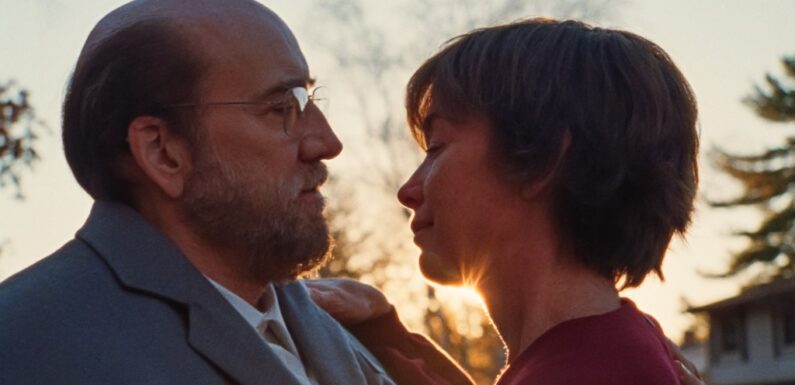
The Zurich Film Festival boasts a strong lineup of international films, among them Bradley Cooper’s “Maestro,” Yorgos Lanthimos’ “Poor Things” and Emerald Fennell’s “Saltburn,” and high-profile guests that include Jessica Chastain, Diane Kruger, Ethan Hawke, Todd Haynes and Wim Wenders.
The ZFF this year screens a record number of world and European premieres — 52 from a total of 148. Another 52 films are debut works. “This high number reflects the ZFF’s growing reputation in the global film industry,” says ZFF artistic director Christian Jungen. “The Zurich Film Festival is the perfect festival to boost the prestige of films for the upcoming award season.”
The ZFF is also a key platform for German-language works, Jungen notes. “It’s important for us to have world premieres of big German productions, such as ‘Stella. A Life.’”
Kilian Riedhof’s World War II film tells the fact-based story of a young Jewish woman in Berlin who, in trying to survive and save herself and her parents from deportation to Auschwitz, is forced by the Gestapo to betray other Jews, including her friends.
“It’s a very moving film because she is both a victim and a perpetrator,” Jungen says.
Another big German-language screener is Hans Steinbichler’s “A Whole Life,” an adaptation of Robert Seethaler’s bestselling novel. “It’s about a man growing up in the Alps and also a reflection of how the Alps changed with tourism. That’s something that resonates particularly well in Switzerland.”
A major international highlight, adds Jungen, is the opening night film, Kristoffer Borgli’s “Dream Scenario,” starring Nicolas Cage.
“Cinema is like a seismograph that registers the trends in society, what we are talking about, what concerns us, and the impact of social media on the daily life of regular people is definitely a big topic.
“This film is a black comedy about a professor whose life completely changes when he becomes a social media star but it’s also a reflection not only on celebrity culture but also on cancel culture, which often follows celebrity culture. I think it’s one of the best performances of Nicolas Cage’s career. I’m curious to see how it resonates with our audience here.”
South Korean cinema is the focus of the fest’s New World View section, which highlights countries experiencing a cinematic renaissance.
“There has been a new wave of talent and quality for 10, 15 years now,” says Jungen. “What’s really extraordinary is that the production values — the technical quality, the editing, the camera — are really at a Hollywood level. The stories often are about the difficult ties between the poor and the rich and often its genre cinema but with a social conscience. And although they are locally rooted, the topics are very universal.”
On the industry side, the ZFF is paying tribute to Fred Kogel, CEO of Munich-based entertainment group Leonine Studios, and Swiss producer Michel Merkt, whose recent works include Ruben Östlund’s Palme d’Or-winning “Triangle of Sadness.”
“Fred Kogel has a long career in film and entertainment,” notes Jungen. “He’s really a visionary person. With Leonine Studios he built a studio from scratch, which allows the creatives to do what they like most, to be creative, to do their films. And the umbrella company takes care of all the other aspects, marketing, distribution.”
Jungen adds: “Leonine is capable of producing films that have a broader appeal and are also seen internationally.” The company has enjoyed huge worldwide success with its “School of Magical Animals” family film franchise.
The ZFF is presenting Kogel with its Game Changer Award “to acknowledge how he changed the German industry. He’s the Bayern Munich of Germany – No. 1 in his own market but also capable of making waves internationally.”
As for Merkt, Jungen says the Geneva native “is really someone who has helped auteurs realize their visions.”
Merkt, who is receiving the ZFF’s Career Achievement Award, has worked with the likes of David Cronenberg, Paul Verhoeven, Maren Ade, Jacques Audiard and Xavier Dolan.
He has also demonstrated that films from a small country like Switzerland can “have a lot of success internationally if you have the right mindset. We have a close relationship with him – 15 of his productions have played at the Zurich Film Festival and he was a juror here in 2017. … It felt like the right moment to acknowledge this extraordinary career.”
Merkt’s latest production, Ira Sachs’ “Passages,” screens at the fest.
The Zurich Summit, the ZFF’s largest industry event, will again be taking the pulse of the industry with day-long discussions on some of the most pressing issues facing the entertainment sector.
“A hot topic we’re going to discuss is, are film festivals drifting away from what works in theaters?”
Film festivals should promote films and also help their theatrical performance, Jungen adds. “But more and more some film festivals have become smaller, maybe more edgy, but have taken a life of their own. It’s like you have a festival film and then you have films for the market. We’re going to discuss what the role of festivals is these days. Shouldn’t festivals stay tied to the market? At least in Zurich we want to be there for films that also get on screens after they premiere here at our festival.”
Another timely topic will be “how to bring back positive vibes to an industry that needs healing, that needs deals, that needs to end strikes.
“As difficult as it was to get stars this year, and it really was a nightmare with the strike — so many decisions were suspended or you wouldn’t get an answers – on the industry side everybody wanted to come. There is a big need to meet, to have an exchange and to talk, so I think the Zurich Summit comes at the right time.”
Read More About:
Source: Read Full Article